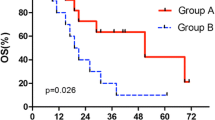Abstract
Background
The diagnosis of distant metastasis on preoperative examinations for non-small cell lung cancer (NSCLC) can be challenging, leading to surgery for some patients with uncertain metastasis. This study evaluated the prognostic impact of delayed diagnosis of metastasis on patients who underwent upfront surgery.
Methods
The study enrolled patients who underwent lobectomy or pneumonectomy for NSCLC between June 2010 and December 2017 and evaluated the presence of distant metastasis before surgery. Overall survival (OS) for patients with stage IV cancer was compared with that for patients without metastasis, and the prognostic factors were analyzed.
Results
Of 3046 patients (mean age, 63 years; 1770 men), 100 (3.3 %) had distant metastasis, diagnosed preoperatively in 1.4 % (42/3046) and postoperatively in 1.9 % (58/3046) of the patients. The two most common metastasis sites diagnosed after surgery were contralateral lung (22/58, 37.9 %) and ipsilateral pleura (16/58, 27.6 %). The OS (median, 42.7 months) for the patients with stage IV cancer diagnosed postoperatively was comparable with that for the patients with stage IIIB cancer (P = 0.865), whereas the OS (median OS, 91.7 months) for the patients with stage IV cancer diagnosed preoperatively was better than for the patients with stage IIIB cancer (P = 0.001). Among the patients with distant metastasis, squamous cell type (hazard ratio [HR], 3.15; P = 0.002) and systemic treatment for metastasis (HR, 2.42; P = 0.002) were independent predictors of worse OS.
Conclusions
Among NSCLC patients undergoing upfront surgery, the OS for the patients with stage IV cancer diagnosed postoperatively was comparable with that for the patients with stage IIIB cancer. For patients with stage IV disease, squamous cell type and systemic treatment for metastasis were prognostic factors for poorer OS.




Similar content being viewed by others
REFERENCES
Siegel RL, Miller KD, Jemal A. Cancer statistics, 2019. CA. 2019;69:7–34.
Gomez DR, Blumenschein GR Jr, Lee JJ, Hernandez M, Ye R, Camidge DR, et al. Local consolidative therapy versus maintenance therapy or observation for patients with oligometastatic non-small cell lung cancer without progression after first-line systemic therapy: a multicentre, randomised, controlled, phase 2 study. Lancet Oncol. 2016;17:1672–82.
Gomez DR, Tang C, Zhang J, Blumenschein GR Jr, Hernandez M, Lee JJ, et al. Local consolidative therapy vs maintenance therapy or observation for patients with oligometastatic non-small cell lung cancer: long-term results of a multi-institutional, phase II, randomized study. J Clin Oncol. 2019;37:1558–65.
Palma DA, Olson R, Harrow S, Gaede S, Louie AV, Haasbeek C, et al. Stereotactic ablative radiotherapy versus standard of care palliative treatment in patients with oligometastatic cancers (SABR-COMET): a randomised, phase 2, open-label trial. Lancet London, England. 2019;393:2051–8.
National Comprehensive Cancer Network. Non-Small Cell Lung Cancer (version 3.2023). Retrieved September 18, 2023 at https://www.nccn.org/professionals/physician_gls/pdf/nscl.pdf.
Opitz I, Patella M, Payrard L, Perentes JY, Inderbitzi R, Gelpke H, et al. Prognostic factors of oligometastatic non-small-cell lung cancer following radical therapy: a multicentre analysis. Eur J Cardiothorac Surg. 2020;57:1166–72.
Hanagiri T, Takenaka M, Oka S, Shigematsu Y, Nagata Y, Shimokawa H, et al. Results of a surgical resection for patients with stage IV non-small cell lung cancer. Clin Lung Cancer. 2012;13:220–4.
Shen H, Cao Y, Li X, Tan Y, Chen J, Yang Z, et al. Surgical intervention improves survival for metastatic non-small cell lung cancer patients. Medicine. 2016;95:e3800.
Yang CJ, Gu L, Shah SA, Yerokun BA, D’Amico TA, Hartwig MG, et al. Long-term outcomes of surgical resection for stage IV non-small cell lung cancer: a national analysis. Lung Cancer. 2018;115:75–83.
Sun Z, Sui X, Yang F, Wang J. Effects of primary tumor resection on the survival of patients with stage IV extrathoracic metastatic non-small cell lung cancer: a population-based study. Lung Cancer. 2019;129:98–106.
Park S, Lee SM, Choe J, Choi S, Do K-H, Seo JB. Recurrence patterns and patient outcomes in resected lung adenocarcinoma differ according to ground-glass opacity at CT. Radiology. 2023;307:e222422.
Detterbeck FC, Franklin WA, Nicholson AG, Girard N, Arenberg DA, Travis WD, et al. The IASLC Lung Cancer Staging Project: background data and proposed criteria to distinguish separate primary lung cancers from metastatic foci in patients with two lung tumors in the forthcoming eighth edition of the TNM Classification for Lung Cancer. J Thorac Oncol. 2016;11:651–65.
Suh YJ, Lee HJ, Sung P, Yoen H, Kim S, Han S, et al. A novel algorithm to differentiate between multiple primary lung cancers and intrapulmonary metastasis in multiple lung cancers with multiple pulmonary sites of involvement. J Thorac Oncol. 2020;15:203–15.
Ashworth A, Rodrigues G, Boldt G, Palma D. Is there an oligometastatic state in non-small cell lung cancer? A systematic review of the literature. Lung Cancer. 2013;82:197–203.
Frost N, Tessmer A, Schmittel A, van Laak V, Raspe M, Ruwwe-Glösenkamp C, et al. Local ablative treatment for synchronous single organ oligometastatic lung cancer: a propensity score analysis of 180 patients. Lung Cancer. 2018;125:164–73.
Author information
Authors and Affiliations
Corresponding author
Ethics declarations
Disclosure
There are no conflicts of interest.
Additional information
Publisher's Note
Springer Nature remains neutral with regard to jurisdictional claims in published maps and institutional affiliations.
Supplementary Information
Below is the link to the electronic supplementary material.
Rights and permissions
Springer Nature or its licensor (e.g. a society or other partner) holds exclusive rights to this article under a publishing agreement with the author(s) or other rightsholder(s); author self-archiving of the accepted manuscript version of this article is solely governed by the terms of such publishing agreement and applicable law.
About this article
Cite this article
Park, S., Choe, J., Lee, S.M. et al. Surgical Outcomes in Non-Small Cell Lung Cancer with Distant Metastasis: The Prognostic Significance of Delayed Metastasis Diagnosis. Ann Surg Oncol 31, 3448–3458 (2024). https://doi.org/10.1245/s10434-024-14984-9
Received:
Accepted:
Published:
Issue Date:
DOI: https://doi.org/10.1245/s10434-024-14984-9




